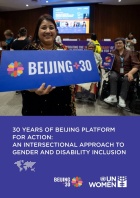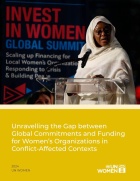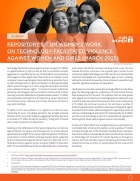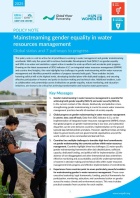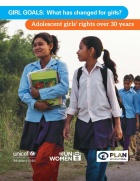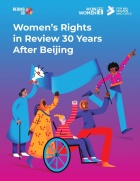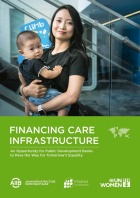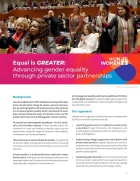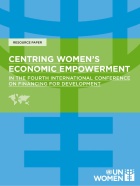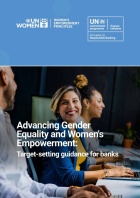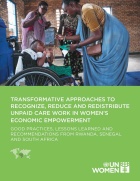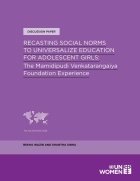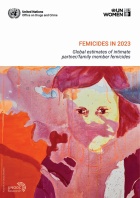Date:
This compendium of case studies collected for the Beijing+30 review process examines lessons learned and good practices on gender, disability inclusion, and intersectionality. It aims to share reflections for UN entities, Member States, policymakers, and civil society organizations. It synthesizes best practices, innovative approaches, and collaborative efforts to enhance sustainable development and human rights for all.
Date:
This policy paper highlights how the 12 critical areas of concern from the Beijing Platform for Action have progressed or faced continuing entrenched barriers and dealt with new challenges in the 30 years since the United Nations’ Fourth World Conference on Women held in Beijing. The focus is specifically on how gender inequality and disability exclusion both compound and create unique concerns for women and girls with disabilities.
Date:
This research paper interrogates the gap between the commitments by the United Nations and donors to increase funding for women’s organizations in conflict-affected countries, and the lower funding reportedly received by these organizations in recent years. It provides a more precise accounting of funding flows and explanations for why these pledges and commitments have not yet translated into more resources for women’s organizations at the frontline of crises.
Date:
This repository reflects UN Women’s work addressing a critical and growing form of violence that disproportionately affects women and girls worldwide: technology-facilitated violence against women and girls. The repository stands as a resource for policymakers, practitioners, and advocates, equipping them with the insights and tools needed to combat technology-facilitated violence and create a safer digital space for women and girls.
Date:
The “Women in politics: 2025” map illustrates the underrepresentation of women in executive positions and parliaments as of 1 January 2025. The data reveal a discouraging outlook compared to 2024: while there has been only a fractional increase in the number of women parliamentarians, their representation in executive positions has declined compared to men, slowing down progress towards achieving equality in politics.
Date:
This policy brief highlights the urgent need to integrate gender considerations into water governance to achieve Sustainable Development Goals 5 (gender equality) and 6 (clean water and sanitation). Despite progress, implementation gaps remain due to lack of funding, data, and women’s inclusion in decision-making. The brief outlines seven key enablers, including leadership, legal frameworks, and monitoring systems, to accelerate gender-responsive water management and ensure equitable benefits for all.
Date:
This report takes stock of progress for girls since the Beijing Platform for Action was endorsed. It highlights issues such as child marriage, in which progress has been made, but also points to areas where action is urgently needed, such as access to digital technology. The report offers key recommendations on how to advance adolescent girls’ rights, including through explicit targets for changing outcomes for adolescent girls.
Date:
This summary report highlights findings from the UN Secretary-General’s review of global progress on gender equality 30 years on from the 1995 Beijing Declaration and Platform for Action. While the findings point to advances such as anti-discrimination laws and gender-responsive climate plans, they also note persistent gender discrimination and emphasize the platform’s continued importance, including in reaching the Sustainable Development Goals.
Date:
This report highlights the urgent need for investments in care infrastructure, essential services like childcare, elder care, and health care that support caregivers and strengthen economies. The report outlines how public development banks can drive change by financing care services alongside care-supporting basic infrastructure. Investing in care boosts economies, creates jobs, and promotes gender equality.
Date:
This results snapshot of UN Women’s engagements with the private sector emphasizes the private sector’s role in creating jobs, innovating products, and fostering inclusive economies. The document outlines strategies like supporting governments, implementing strategic programs, and coordinating with UN entities. It also highlights the Women’s Empowerment Principles (WEPs) and showcases successful initiatives and partnerships driving progress in gender equality and women’s empowerment worldwide.
Date:
Gender equality is a fundamental human right. Despite global efforts, no country has achieved full equality. The private sector plays a key role through job creation and innovation. The document outlines 12 critical areas from the Beijing Declaration and provides strategies for the private sector, including achieving gender parity in leadership, safeguarding women and girls, investing in skills development, closing the digital gender gap, and creating supportive workplace cultures.
Date:
Artificial intelligence (AI) can advance gender equality but may also perpetuate inequalities if not managed properly. This UN Women publication emphasizes the need for inclusive, safe, and equitable AI systems. It highlights the private sector's role in achieving this and calls for partnerships to support women in AI leadership, foster opportunities for women entrepreneurs, bridge the gender digital divide, and ensure AI policies integrate gender dimensions.
Date:
This paper aims to help governments, policymakers, multilateral organizations, the private sector, and civil society to integrate women’s economic empowerment priorities into the process of the Fourth International Conference on Financing for Development and the subsequent implementation of its outcome, by offering substantive analysis and targeted recommendations introducing a gender lens to key financial policy solutions.
Date:
This report marks the sixth and final monitoring cycle of the Inter-Agency Standing Committee’s (IASC) 2017 “Policy on gender equality and the empowerment of women and girls in humanitarian action”. It provides a snapshot of the IASC’s output in 2023 and allows for cross comparison with the baseline established with the 2018 GAF report and the subsequent 2019, 2020, 2021, and 2022 reports.
Date:
Widespread gender-based violence, including conflict-related sexual violence, has been a defining feature of the violent conflict in Sudan.
Date:
This guidance equips banks to prioritize women’s empowerment across their value chain. It provides a holistic framework for action, practical indicators, checklists, and case studies to support banks to advance gender equality and women’s empowerment in the workplace, marketplace, and community.
Date:
Paving the way for a more equitable society, this publication illustrates gender-transformative approaches and recommendations for future programming. As UN Women presents insights from the pilot phase of the 3R Programme in Rwanda, Senegal, and South Africa, readers are invited to explore how evidence-based policy dialogues, local development plans, and climate change mitigation efforts can help recognize, reduce, and redistribute unpaid care and domestic work.
Date:
Offering a counterpoint to the behaviour change strategies increasingly proposed in international development, this paper discusses a community-led approach to transforming social norms on child labour, education, and gender. It shows how the Mamidipudi Venkatarangaiya Foundation’s adolescent girls’ programme in Telangana State, India, which uses multi-layered strategies to address the obstacles that keep girls out of school, has led to sustainable norms change and concrete improvements in girls’ lives.
Date:
This discussion paper reviews seven key examples of how social norms are being measured in efforts to achieve gender equality. Through this analysis, several cross-cutting shortcomings become evident, limiting the effectiveness of norms-based work in improving gender equality outcomes. The paper concludes by outlining components of a future framework for measuring social norms and gender equality, suggesting what should be measured, why, how, and by whom.
Date:
Concerted, urgent action is needed to improve the knowledge base and strengthen responses to gender-related killings (femicides/feminicides) and other forms of gender-based violence against women and girls. This report presents global and regional estimates in 2023, available time trends and country data, and selected practices for preventing femicides.

